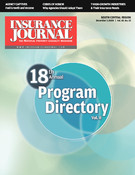At least four new surety bonds have hit the market in Texas and Arkansas in the last six months, part of a wave of new bonding requirements nationwide.
“This past year has seemed to be especially active statutorily and even with regulation in terms of requiring or introducing new bond requirements,” said Rob Duke, director of underwriting and assistant counsel for the Surety & Fidelity Association of America. “In this environment, there may be a call for greater oversight and greater consumer protections, and a bond can play a role in that.”
This spring, Utah and Arkansas became the first states to fully regulate appraisal management companies through their state’s real estate appraiser boards. Four more states enacted similar legislation by the fall, and industry experts anticipate as many as 20 more states to consider AMC legislation in 2010.
Arkansas so far is the only state that requires appraisal management companies to post a surety bond. Every appraisal management company operating in Arkansas must post a $20,000 surety bond with the real estate appraiser board starting January 1.
Anyone with standing can file a claim against the new bond, including appraisers with a claim against the appraisal management company. But the claims of allegedly maligned consumers will take precedence over all other bond claims, according to the legislation.
Instead of a bond, appraisal management companies can also submit a deposit of cash or security. In addition, companies must verify they use only licensed or certified appraisers. They’re also required to ensure that appraisals comply with the industry’s Uniform Standards of Professional Appraisal Practice.
A similar push to improve consumer protection is at the root of a trio of new bonding requirements in Texas that target identity recovery companies, mortgage originators and title agents.
Traditionally, identity recovery companies needed an insurance policy and a client reimbursement account in order to operate legally in the state. Now, identity recovery companies will have to post a surety bond, letter of credit, a CD or cash in order to secure a license. The bond amount has to be at least $25,000, or “an amount equal to 5 percent of the gross consideration of the provider received from consumers from the sale of all identity recovery service contracts issued and outstanding in this state, minus any claims,” according to the bill’s final language. Identity recovery companies must also maintain — or have a parent company that maintains — a net worth or stockholders’ equity of at least $100 million. The new requirements will apply to all contracts entered into after January 1.
Texas lawmakers also passed legislation aimed at curbing fraud and risk among mortgage originators. The “Secure and Fair Enforce-ment for Mortgage Licensing Act” was drafted to protect consumers from unfair or fraudulent practices by mortgage loan originators. The law requires all mortgage originators — whether they’re employed by a mortgage broker or not — to obtain a surety bond or to pay into a reimbursement fund that covers default, bankruptcy and other claims. Originators must also possess current and complete licenses.
The new regulations apply to credit unions, and there may be some lingering impacts on motor home and RV dealers, as the law includes new language and requirements for those who sell motor vehicles that serve as primary dwelling units.
A similar consumer protection bill for Texas title agents was set to take effect on Sept. 1, but the insurance department is still working with stakeholders to hammer out particulars for the bonding requirements. Bond amounts are set to vary depending on the population of the title agent’s principal county of business. Face values will range from $25,000 for smaller areas to $150,000 for those in metropolitan areas.
Topics Texas Legislation
Was this article valuable?
Here are more articles you may enjoy.


 Allstate CEO Wilson Takes on Affordability Issue During Earnings Call
Allstate CEO Wilson Takes on Affordability Issue During Earnings Call  Allstate Doubles Q4 Net Income While Auto Underwriting Income Triples
Allstate Doubles Q4 Net Income While Auto Underwriting Income Triples  Q4 Global Commercial Insurance Rates Drop 4%, in 6th Quarterly Decline: Marsh
Q4 Global Commercial Insurance Rates Drop 4%, in 6th Quarterly Decline: Marsh  AIG, Chubb Can’t Use ‘Bump-Up’ Provision in D&O Policy to Avoid Coverage
AIG, Chubb Can’t Use ‘Bump-Up’ Provision in D&O Policy to Avoid Coverage 


